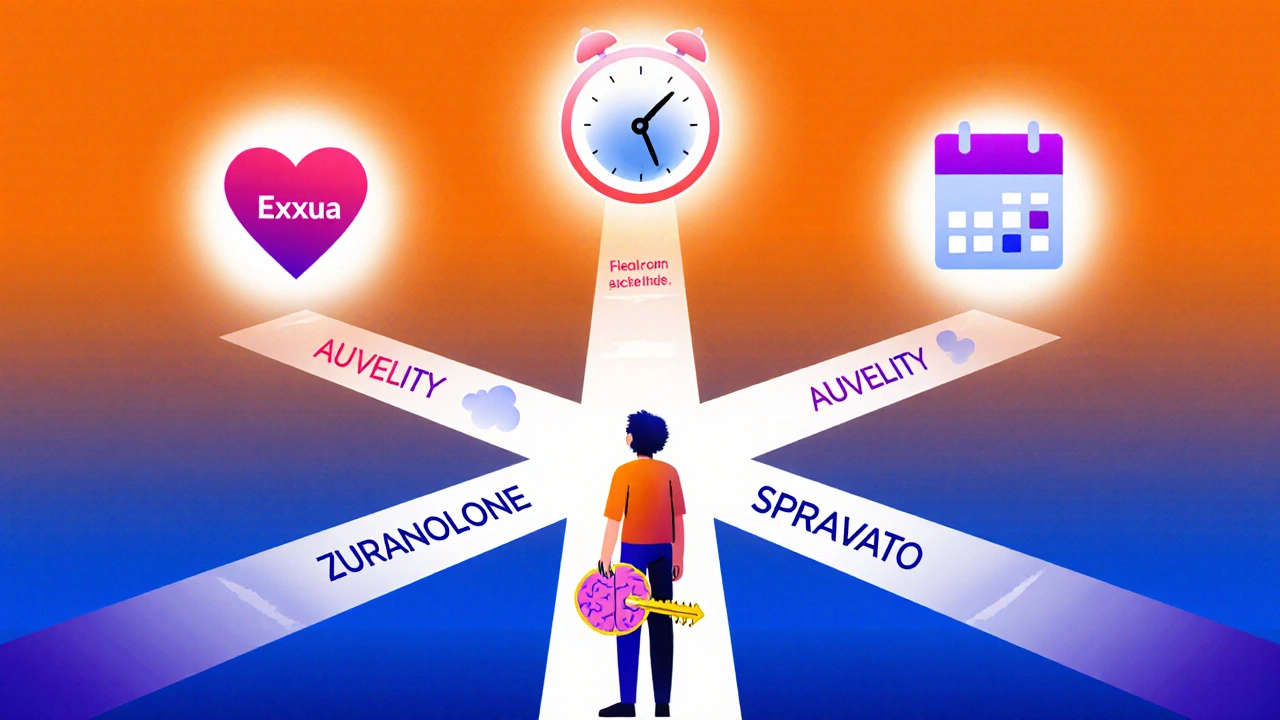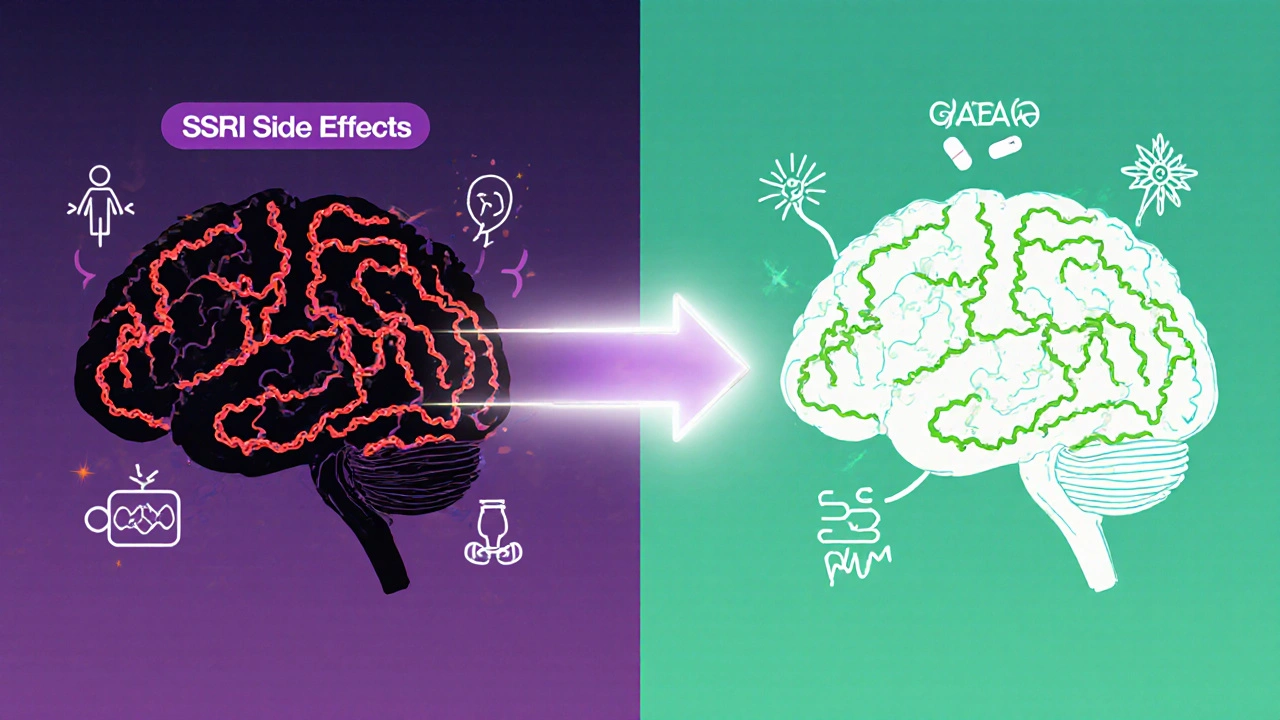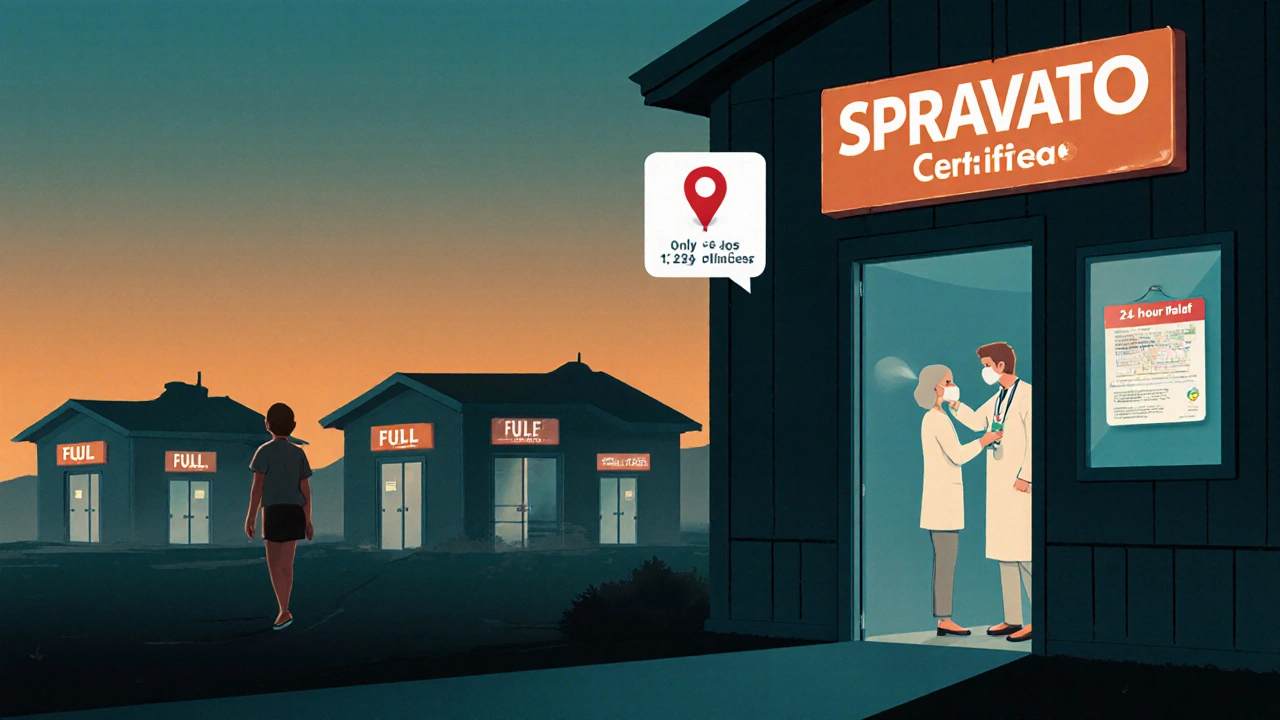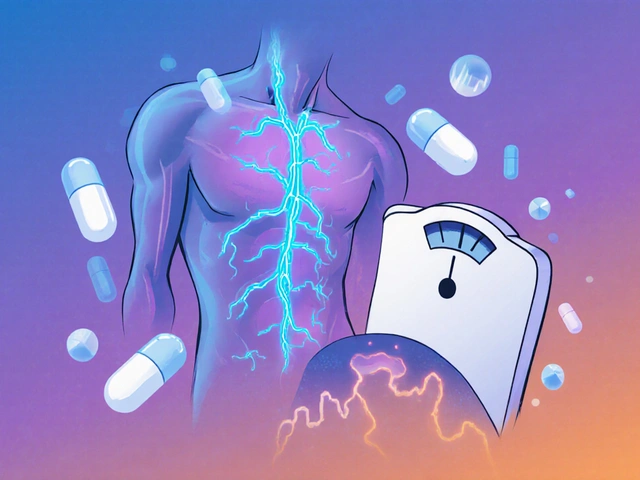New Antidepressants with Better Side Effect Profiles: What’s Emerging in 2025

For decades, the go-to antidepressants-SSRIs like Zoloft and Prozac-came with a familiar set of problems: sexual dysfunction, weight gain, nausea, and weeks of waiting before you felt any real change. If you’ve been on one of these, you know the frustration. You’re not alone. Up to 70% of people on SSRIs report sexual side effects. Nearly half gain weight. And many give up because the trade-off feels too steep.
But things are changing. In 2023 and 2024, the FDA approved a wave of new antidepressants that don’t just work differently-they work better for many people, especially when it comes to side effects. These aren’t tweaks of old drugs. They’re built on entirely new science. And by late 2025, they’re already reshaping how depression is treated.
What’s Different About These New Antidepressants?
Traditional antidepressants mostly focus on serotonin and norepinephrine. The new ones? They target glutamate, GABA, and even brain receptors linked to stress and inflammation. This isn’t just a different chemical path-it’s a faster, cleaner route to relief.
Take Exxua (gepirone), approved in September 2023. It’s the first new chemical entity for depression in over a decade. Unlike SSRIs, it doesn’t flood your brain with serotonin. Instead, it gently activates serotonin receptors in a way that mimics natural brain signaling. The result? A 90% drop in sexual side effects compared to older drugs. In clinical trials, only 2-3% of users reported sexual dysfunction. That’s not a minor improvement-it’s a game-changer for people who’ve quit treatment because of this issue.
Then there’s Auvelity (dextromethorphan/bupropion), approved in 2022. It’s a two-in-one pill that works within days, not weeks. Dextromethorphan blocks NMDA receptors (the same target as ketamine), while bupropion slows down how fast your body breaks down dextromethorphan. This combo gives you rapid mood lift-often in 1-2 weeks-with less weight gain than duloxetine or venlafaxine. People report fewer stomach issues, too.
The Rapid-Acting Breakthroughs
If you’ve ever waited six weeks to feel better, you know how painful that delay can be. Two new drugs cut that time dramatically.
SPRAVATO (esketamine), approved in 2019, is a nasal spray derived from ketamine. It works in hours. In one JAMA Psychiatry study, 64% of treatment-resistant patients saw symptom reduction within 24 hours. But there’s a catch: it causes dissociation in 45-55% of users. People feel detached from their body, like they’re floating. It’s temporary-lasts about an hour-but terrifying if you’re unprepared. That’s why it’s only given in certified clinics, with 2-hour monitoring after each dose. There are only 1,243 of these clinics in the U.S. as of October 2025. Access is still a major barrier.
Zuranolone (Zurzuvae), approved in 2023 for postpartum depression and expanded to major depression in October 2025, is a pill you take for just 14 days. It works by calming overactive brain circuits through GABA-A receptors. In trials, 70% of postpartum patients improved significantly. For general depression, 53% responded by day 15-compared to 35% on placebo. It’s fast, it’s short, and it avoids the chronic side effects of daily pills. But it’s not without trade-offs: 25% get dizzy, 20% feel drowsy. And you have to take it with food, or absorption drops by half.
Side Effect Showdown: Old vs. New
Here’s how the new drugs stack up against the old ones, based on a major October 2025 Lancet review of 151 trials:
| Side Effect | SSRIs (e.g., sertraline, escitalopram) | Exxua (gepirone) | Auvelity | Zuranolone | SPRAVATO |
|---|---|---|---|---|---|
| Sexual dysfunction | 30-50% | 2-3% | 15-20% | 5-8% | 10-12% |
| Weight gain (6 months) | 10-15% | 1-2% | 5-7% | 2-4% | 1-3% |
| Onset of action | 4-8 weeks | 2-3 weeks | 1-2 weeks | 3-7 days | 24-48 hours |
| Common adverse effect | Nausea, insomnia | Mild headache | Headache, dizziness | Dizziness, somnolence | Dissociation, dizziness |
| Administration | Oral, daily | Oral, daily | Oral, daily | Oral, 14-day course | Nasal spray, clinic-only |
Notice the pattern: the newer drugs either eliminate or drastically reduce the side effects that make people quit. Exxua and Zuranolone are especially strong on sexual function and weight. SPRAVATO is the fastest, but the dissociation makes it unsuitable for many.

Cost and Access: The Hidden Hurdles
These drugs aren’t cheap. And insurance doesn’t always cover them.
Generic fluoxetine? Around $4 for 30 tablets. Exxua? About $300 a month. Zuranolone’s 14-day course? $9,450. SPRAVATO? $880 per dose-and you need multiple doses over weeks. Medicare and private insurers often require prior authorization. In 92% of commercial plans, SPRAVATO needs pre-approval. Zuranolone is covered by about 65% of plans, but often with strict limits.
And then there’s access. You can’t just walk into your local pharmacy for SPRAVATO. You need to go to a certified clinic. In rural areas, that means driving hours-or going without. Primary care doctors still feel underprepared to prescribe these newer drugs. A 2025 AAFP survey found only 38% of PCPs feel confident managing Zuranolone.
Who Benefits Most?
These aren’t one-size-fits-all. The best choice depends on your history, your body, and your goals.
- If you’ve quit SSRIs because of sexual side effects, Exxua is likely your best bet.
- If you need fast relief and can handle clinic visits, SPRAVATO works-but only if dissociation won’t scare you off.
- If you’re a new parent with postpartum depression, Zuranolone is the first FDA-approved treatment designed specifically for that.
- If you want rapid results without clinic visits and have struggled with weight gain on other drugs, Auvelity offers a balanced middle ground.
And if you’ve tried multiple antidepressants without success? These drugs are now the standard second- and third-line options. In fact, 85% of treatment-resistant depression cases now start with one of these newer agents.

What’s Next? The Future Is Personalized
The real breakthrough isn’t just one new drug-it’s the shift toward matching the drug to the person.
Researchers are now testing genetic tests that predict who’s likely to gain weight, who’ll get dizziness, or who’ll respond best to glutamate-targeting drugs. The NIH has funded a $2.4 million project to build a test that predicts side effects with 85% accuracy. That’s not science fiction-it’s coming by 2027.
Dr. Dervla Kelly, a consultant psychiatrist in London, puts it simply: “The future isn’t about finding the best antidepressant. It’s about finding the right one for you.”
That’s why the next wave of treatment isn’t just about better drugs-it’s about smarter prescribing. Health systems like Mayo Clinic are already using algorithms that factor in your weight, heart health, and past side effects to recommend the safest option. No more trial and error. No more waiting months to find out if a drug works-or if it breaks you.
What You Should Know Right Now
If you’re on an SSRI and struggling with side effects, don’t just suffer through it. Talk to your doctor about Exxua or Auvelity. If you’ve tried multiple meds without success, ask about Zuranolone or SPRAVATO. Bring the data. Ask about coverage. Ask about access.
These drugs aren’t perfect. Zuranolone causes dizziness. SPRAVATO can be scary. Exxua isn’t available everywhere yet. But they’re the first real alternatives in decades to the old, heavy side effect burden.
The message is clear: depression treatment doesn’t have to mean trading your sex life, your weight, or your peace of mind for a little relief. The tools to do better are here. Now it’s about using them.
Are the new antidepressants safer than SSRIs?
Yes, for specific side effects. Newer drugs like Exxua and Zuranolone have dramatically lower rates of sexual dysfunction and weight gain-often 70-90% lower than SSRIs. However, they carry different risks: SPRAVATO can cause dissociation, and Zuranolone may cause dizziness or sleepiness. Safety depends on the drug and your personal health history.
How fast do the new antidepressants work?
Traditional SSRIs take 4-8 weeks. Newer drugs are much faster: Auvelity can work in 1-2 weeks, Zuranolone in 3-7 days, and SPRAVATO in as little as 24 hours. This speed is one of their biggest advantages, especially for people with severe depression or suicidal thoughts.
Can I switch from an SSRI to a new antidepressant?
Yes, but not without medical supervision. Stopping an SSRI abruptly can cause withdrawal symptoms like dizziness, brain zaps, or anxiety. Your doctor will likely taper you off slowly before starting the new medication. Some combinations (like SPRAVATO with SSRIs) require special protocols to avoid serotonin syndrome.
Why aren’t these new drugs prescribed more often?
Cost and access are the biggest barriers. Many are expensive and require insurance pre-approval. SPRAVATO must be given in certified clinics, which are scarce outside cities. Also, many doctors haven’t been trained on how to use them. As of 2025, only 38% of primary care physicians feel confident prescribing Zuranolone.
Do these drugs cure depression?
No drug cures depression. These new agents help manage symptoms, often very effectively. Zuranolone’s 14-day course treats acute episodes. SPRAVATO and Exxua are used for ongoing management. Long-term data beyond 6-12 months is still limited. Most experts recommend combining these with therapy and lifestyle changes for lasting results.
Is psilocybin an approved antidepressant?
Not yet. Psilocybin has received FDA breakthrough therapy designation for treatment-resistant depression and showed remarkable results in 2024 trials-with effects lasting up to 6 months after one dose. But it’s still investigational. It’s only available in clinical trials or in states where psychedelic therapy is legal under special programs.




Nicole M
I’ve been on Zoloft for 3 years and the sexual side effects nearly ended my relationship. Found out about Exxua last month-my psychiatrist was skeptical but agreed to try it. Two weeks in, I’m sleeping better, no brain fog, and I actually want to be intimate again. No joke, I cried the first time it happened. This isn’t just medicine, it’s dignity restored.
Arpita Shukla
Exxua sounds great but have you checked the drug interactions? Gepirone is a 5-HT1A agonist and can mess with MAOIs or even some SSRIs if not tapered right. Also, liver enzymes-monitor those. I’m not saying don’t try it, but don’t just trust your doctor’s word without asking for the prescribing info. There’s a reason it’s not on every formulary yet.
Alex Ramos
Just wanted to say-thank you for writing this. I’m a nurse in rural Kansas and I’ve seen people drive 3 hours just to get SPRAVATO. One guy came back crying because he felt like himself for the first time in 8 years. But then he told me he had to sell his bike to pay for the third dose. These drugs are miracles, but only if you’ve got money, insurance, and a car. We need to fix that.
Benjamin Stöffler
Let’s not romanticize pharmacology as some kind of salvation… The brain isn’t a vending machine where you insert a pill and get ‘happiness’ back. You’re still dealing with a neurochemical illusion-just a prettier one. Zuranolone’s 14-day course? That’s not treatment, it’s a temporary placebo with a fancy label. Depression isn’t a chemical imbalance-it’s a story your nervous system has learned to tell. No drug fixes narrative trauma.
Mark Rutkowski
There’s something deeply human in how we’ve moved from ‘take this and suffer’ to ‘here’s a path that respects your body.’ It’s not just science-it’s empathy made into molecules. Exxua doesn’t just reduce sexual side effects-it restores the quiet dignity of wanting to be touched. That’s not a pharmacological win. That’s a cultural one. And it’s about time.
Ryan Everhart
So what you’re saying is we’re trading one set of side effects for another? Dizziness for libido? Dissociation for weight gain? Sounds like the same game with better packaging. And don’t even get me started on the $9k pill. You think someone on SSDI can afford that? Nah. This isn’t progress. It’s capitalism with a lab coat.
David Barry
70% of people on SSRIs report sexual dysfunction? Where’s your source? The FDA’s own meta-analysis says 38%. And Zuranolone’s 25% dizziness? That’s worse than SSRIs’ 18%. You’re cherry-picking numbers to sell a narrative. Also, ‘new science’? GABA modulators have been around since Valium. Stop pretending this is revolutionary.
Alyssa Lopez
These new drugs are total BS. America needs to stop buying into this pharma hype. We used to just work through it. Now everyone wants a magic pill. Zuranolone? Sounds like a scam name. And SPRAVATO? You’re telling me we’re giving people ketamine nasal spray and calling it medicine? What’s next, LSD for anxiety? This is why our healthcare system is broke.
edgar popa
Just switched to Auvelity last week. Took 4 days to feel it. No nausea, no weight gain, and I actually got out of bed without a fight. Best part? My boss didn’t even notice I was gone for 3 weeks. I’m not cured, but I’m alive again. Thanks for the heads up on this.
manish kumar
As someone who’s tried every SSRI under the sun and ended up in the ER from serotonin syndrome after a bad combo, I can tell you-this is the first time I’ve felt hope. Exxua didn’t just work, it felt *right*. Like my brain finally stopped fighting me. And yeah, it’s expensive. But I sold my gaming rig and took a second job. This isn’t a luxury-it’s survival. I’ve got a 7-year-old who needs his dad present, not just physically, but emotionally. These drugs aren’t just chemicals-they’re time. Time with family. Time to laugh. Time to not feel like a ghost in your own life. If you’re on an SSRI and it’s killing your joy, ask for Exxua or Auvelity. Don’t wait until you’re broken beyond repair. The science is here. The question is-are you ready to fight for your life?
Eve Miller
There is no such thing as ‘better’ antidepressants. You are still altering your neurochemistry with synthetic compounds. If you want real change, try therapy, sunlight, exercise, and community. These drugs are band-aids on a hemorrhage. And the fact that people are celebrating a $9,000 pill as ‘progress’ shows how far we’ve fallen from real healing.
Chrisna Bronkhorst
Let’s be real-this is just another way for Big Pharma to make billions while keeping people dependent. Zuranolone’s 14-day course? That’s a subscription model. You’ll need another one in 6 months. And SPRAVATO? Clinics are cash cows. This isn’t medicine. It’s a profit engine wrapped in science-speak. The real breakthrough? A world where therapy is free and antidepressants are optional.